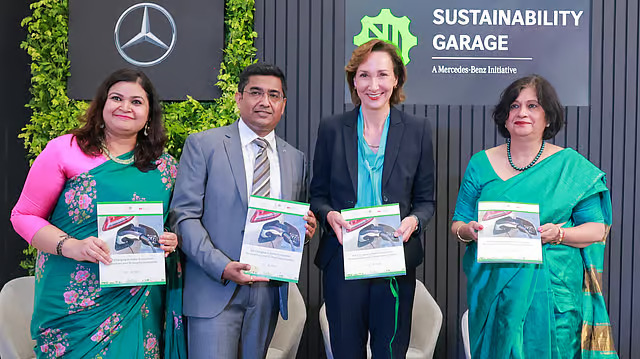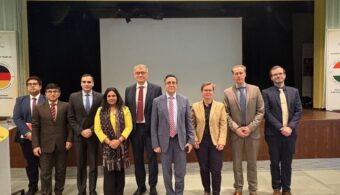In a significant Indo-German push towards clean mobility, Mercedes-Benz Research and Development India (MBRDI), the German automaker’s largest R&D hub outside Germany, and The Energy and Resources Institute (TERI) have unveiled a whitepaper calling for urgent skilling of India’s workforce in EV charging infrastructure. The report, presented at the Mercedes-Benz Sustainability Dialogue India 2025, reflects Germany’s growing commitment to support India’s electric mobility transformation under the wider Indo-German Green and Sustainable Development Partnership.
India–Germany Alignment on Green Mobility
Germany, which had around 160,000 public charging points by end-2024 and has set an ambitious target of 15 million EVs by 2030, is working closely with India to share expertise in charging technologies, renewable integration, and workforce training. Under the Indo-German Green and Sustainable Development Partnership (GSDP), Berlin has pledged up to €10 billion in concessional finance and technical cooperation through 2030, including dedicated programmes such as the €1 billion Green Urban Mobility Partnership that supports e-buses and charging projects.
German companies—including Mercedes-Benz, Volkswagen, BMW, Bosch, and Siemens—already have strong operations in India and are increasingly active in the EV and clean-mobility ecosystem. This collaboration links Germany’s industrial know-how with India’s vast pool of engineering talent, creating a foundation for global green skills.
Addressing Critical Skilling Gaps
The whitepaper, “EV Charging in India: Ecosystem Perspectives and Skilling Opportunities,” identifies charge point operators (CPOs) as the backbone of the EV ecosystem, while pointing to three systemic gaps—lack of hands-on training, absence of standardised modules, and shortage of qualified trainers. The study, based on inputs from 150 experts across India’s EV value chain, reveals that nearly half of the workforce requirements lie in installation and testing of EV chargers and IoT-enabled applications, followed by smart grid integration and fault troubleshooting.
Launch of ‘Future-In-Charge’ Initiative
In response, MBRDI and TERI launched the “Future-In-Charge” skilling programme, part of Mercedes-Benz’s Sustainability Garage. The curriculum—approved by the National Council for Vocational Education and Training (NCVET) and endorsed by the Ministry of Environment, Forests, and Climate Change (MoEFCC)—combines classroom instruction with live equipment training.
“Sustainability goes beyond technology; it is about people. With Future-In-Charge, we are not only bridging the skills gap but also tackling systemic barriers to EV skilling. By equipping young professionals with future-ready skills, we see this as a foundational investment in India’s mobility future and a model that can inspire similar initiatives globally,” said Manu Saale, MD & CEO, MBRDI.
Scaling Green Jobs Nationwide
The pilot cohort of 60 trainees has begun training at TERI’s Gwal Pahari campus near Gurugram, with plans to scale across major EV hubs like Delhi, Bengaluru, Kolkata, and Chennai. These cities, already focal points for Indo-German industry cooperation, are expected to become leading centres of green jobs.
“With India accelerating its shift towards clean mobility, building a skilled workforce in EV charging infrastructure is crucial,” said Dr. Vibha Dhawan, Director General, TERI. “Future-In-Charge is a forward-looking step to bridge industry needs with youth talent and empower professionals to lead India’s green jobs journey with expertise and confidence.”
Broader Indo-German Sustainability Agenda
The Sustainability Dialogue brought together global and Indian leaders, including Renata Jungo Brüngger, Member of the Board of Management, Mercedes-Benz Group AG, and representatives from NITI Aayog, UNDP India, The Asia Foundation, and leading Indian start-ups. Discussions spanned climate innovation, clean mobility, and workforce skilling—areas where India and Germany are natural partners.
As part of their Green and Sustainable Development Partnership, both countries are working towards joint investments in green hydrogen, EV adoption, and vocational skilling. Germany has also committed more than €1 billion in climate finance for India’s mobility-related projects, alongside broader multi-sectoral support.
Towards a Skilled and Sustainable Future
The whitepaper emphasises that India’s EV training must evolve from basic electrical knowledge to integrated curricula combining AI, IoT, smart grids, and customer service. This will ensure a future-ready workforce capable of sustaining India’s EV charging network while generating employment in emerging green hubs.
By combining Germany’s technological leadership with India’s scale and talent, initiatives like Future-In-Charge are not just plugging workforce gaps—they are cementing Indo-German cooperation as a driver of sustainable growth in the 21st century.
Read the full report here: https://teriin.org/policy-brief/ev-charging-india-ecosystem-perspectives-and-skilling-opportunities



